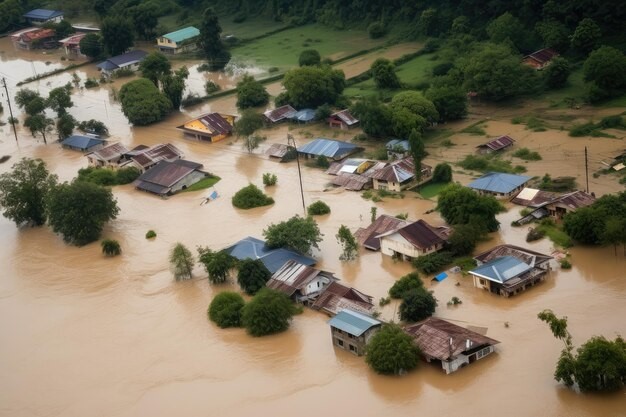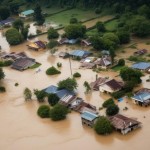In the face of devastating flood disasters in Malaysia, the resilience of small businesses is crucial. Susceptible regions necessitate a proactive approach for immediate survival and sustained long-term operations. Establishing a focal point agency, like the National Disaster Management Agency (NADMA), is pivotal for coordinated disaster management. NADMA streamlines communication, collaboration, and efficient resource deployment across governmental bodies, NGOs, and communities. The agency's involvement extends beyond the government to include partnerships with non-governmental organizations, community groups, and international agencies. This collaborative network ensures a more holistic and inclusive approach to disaster management. Resilient small businesses prioritize disaster preparedness, including location-specific risk understanding, investment in protective infrastructure, and contingency plans. Proactive measures like securing assets and clear evacuation plans form the foundation of resilience. NADMA can leverage the expertise and resources of these diverse stakeholders, fostering a sense of shared responsibility and collective action. This strategic commitment enhances response capabilities and signifies a proactive stance in building resilience and safeguarding communities from natural and man-made disasters.
As issued by the National Security Council (NSC) in 1997 and revised in 2012, Directive No. 20 paves the way for a comprehensive national disaster management policy and plan, offering a structured framework for businesses during and after disasters. This comprehensive policy serves as a blueprint, clearly delineating the roles and responsibilities of different agencies and stakeholders in disaster preparedness, response, and recovery. The policy can incorporate specific measures to support small business resilience, such as facilitating access to financial resources for recovery, providing guidance on implementing resilient infrastructure, and fostering collaboration between businesses and relevant agencies. By aligning the national disaster management plan with small business needs, it ensures a more coordinated and effective response to disasters, ultimately contributing to the overall resilience of the business community.
Other than that, allocating funds from the National Disaster Relief Trust Fund is a strategic move to bolster preparedness and response efforts, involving various agencies, state and district committees, and flood victims. In the context of small business resilience, this financial support can play a pivotal role. Small businesses often lack the financial capacity to independently recover from the impacts of floods, making external support crucial. By channeling funds to relevant agencies and committees, there's an opportunity to enhance the overall disaster response infrastructure, ensuring a more efficient and targeted approach. This can translate to quicker assistance for small businesses in terms of post-flood recovery, helping them rebuild infrastructure, replace damaged inventory, and resume operations swiftly. Moreover, direct financial aid to flood victims, including small business owners, provides immediate relief, addressing their urgent needs and fostering community recovery. The allocation of funds, when strategically directed, becomes a catalyst for strengthening the resilience of small businesses and the affected communities at large.
As Malaysia charts its course in disaster preparedness, enhancing the capabilities of the Special Malaysia Disaster Assistance and Rescue Team (SMART) holds significant implications for small business resilience in disaster situations. SMART, equipped to provide search and rescue, medical, and humanitarian assistance, plays a crucial role in the immediate aftermath of disasters like floods. For small businesses, especially those vulnerable to disruptions, a swift and efficient response is essential. SMART’s enhanced capabilities mean quicker and more effective rescue operations, ensuring the safety of individuals and potentially minimizing damage to businesses. Additionally, the medical and humanitarian aid provided by SMART can address immediate health concerns of business owners and employees, contributing to a faster recovery. By fortifying SMART, the overall disaster response system becomes more adept at safeguarding communities and the economic fabric that small businesses form. This interconnectedness highlights the integral role of specialized disaster response teams in bolstering the resilience of small businesses and aiding in their recovery efforts.
To further strengthen business resilience, it is crucial to regularly conduct drills and exercises, assessing and enhancing the preparedness of disaster management systems. These drills simulate disaster scenarios, allowing emergency responders and relevant agencies to practice coordinated responses. For small businesses, this preparedness is invaluable as it ensures a prompt and organized reaction to potential disruptions. Participating in these exercises familiarizes small business owners and employees with emergency procedures, evacuation routes, and communication protocols, reducing panic and confusion during an actual event. Moreover, it provides an opportunity to assess the resilience of business continuity plans and identify areas for improvement. By integrating small businesses into these drills, the overall community resilience is strengthened, creating a network of prepared and adaptive entities that can collectively withstand and recover from disasters more effectively. This proactive approach is integral to ensuring the sustained operation of small businesses amidst the challenges posed by unforeseen events.
An additional strategy to boost the resilience of small businesses involves fostering public awareness and education on disaster risks and preparedness measures. This becomes a pivotal aspect with direct implications for fortifying the resilience of small businesses. A well-informed community regarding potential risks and the necessary preparedness measures can contribute to creating a more supportive environment for small businesses. In such an environment, educated stakeholders are better equipped to comprehend and adhere to safety protocols, ultimately reducing the overall impact of disasters. Small businesses, in turn, can actively engage in these awareness campaigns by providing information about their own disaster preparedness plans and encouraging employees and customers to participate. Moreover, a well-informed populace is inclined to provide substantial support to local businesses during the recovery phase, thereby strengthening the economic resilience of the community. Small businesses that actively participate in and advocate for public awareness initiatives not only contribute to the resilience of the entire community but also build a commendable and supportive reputation, crucial during challenging times. This integration of public awareness and educational efforts establishes a more resilient ecosystem, empowering small businesses with enhanced capabilities to adeptly navigate disruptions and actively contribute to the comprehensive recovery of the community.
In summary, the collaborative endeavors of governmental agencies, disaster response teams, financial support, community drills, and public awareness initiatives form a holistic ecosystem that fortifies the resilience of small businesses in the challenging aftermath of floods in Malaysia. Small businesses, as integral components of this ecosystem, not only endure but flourish, making significant contributions to the overall recovery of the community.










